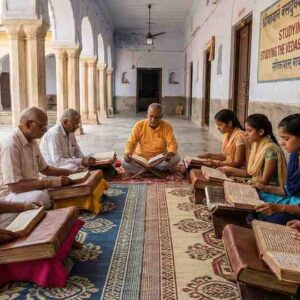A Path to Inner Harmony in a Chaotic World
Faith has long been a cornerstone of human existence, offering solace and purpose during life’s most turbulent moments. Across cultures and traditions, belief systems provide individuals with a framework for navigating challenges, fostering resilience, and finding inner peace. In India, a land of diverse faiths and philosophies, the transformative power of faith is deeply woven into the cultural fabric, influencing daily life, societal structures, and even global perspectives.
As the world grapples with uncertainty and rapid change, the relevance of faith is gaining renewed attention, not just as a spiritual anchor but as a practical tool for well-being.
1. Faith as a Source of Resilience
Faith empowers individuals to endure hardships by instilling hope and fostering resilience. TheBhagavad Gita, a spiritual and philosophical epic, encapsulates this message when Krishna advises Arjuna to act with unwavering faith in the face of moral dilemmas. This ancient wisdom remains relevant in modern times, guiding individuals to persevere through life’s challenges.
A 2023 study by the Indian Institute of Mental Health and Well-being found that individuals who engage in spiritual practices or adhere to a faith-based philosophy reported 40% higher levels of emotional resilience and mental stability during crises like the COVID-19 pandemic.
2. The Healing Power of Rituals
Rituals, an integral part of many faiths, serve as tools for mindfulness and emotional healing. From lighting lamps during Diwali to participating in communal prayers at a mosque or church, rituals foster a sense of belonging and connection to the divine.
In 2023, theFestivals of Healinginitiative, launched by India’s Ministry of Culture, highlighted how faith-based rituals contribute to mental and emotional well-being. The campaign encouraged interfaith participation, celebrating the universal aspects of spiritual practices.
3. Faith and Community: Strengthening Social Bonds
Faith often extends beyond personal beliefs, fostering a sense of community and shared purpose. Temples, mosques, gurudwaras, and churches across India act as hubs for collective worship, charity, and social welfare. These spaces encourage individuals to find strength in unity and contribute to societal harmony.
TheSeva for Allcampaign in 2023, led by ISKCON and other spiritual organizations, exemplified this. Volunteers provided free meals, healthcare, and education to underprivileged communities, showcasing how faith-driven initiatives uplift society.
4. Faith as a Tool for Modern Challenges
Faith is increasingly being recognized as a resource for addressing contemporary issues like stress, loneliness, and mental health. Meditation and mindfulness practices, often rooted in Hindu and Buddhist traditions, are now mainstream tools for achieving inner peace.
Apps like Calm and Headspace, inspired by ancient spiritual practices, have seen exponential growth, with millions worldwide using them to cope with anxiety and enhance focus. These digital adaptations bridge the gap between traditional wisdom and modern needs.
5. Balancing Faith and Rationality
While faith offers solace, its role in modern life often raises questions about balancing belief with rationality. Critics argue that blind faith can perpetuate dogma, while proponents emphasize the need for informed and reflective spirituality.
Educational initiatives, such as theIndian Knowledge Systemsprogram, encourage individuals to explore the philosophical depths of their faiths, fostering a balance between devotion and understanding.
6. Faith in a Global Context
India’s pluralistic society showcases the coexistence of diverse faiths. Festivals like Diwali, Eid, and Christmas are celebrated with equal fervor, promoting a spirit of inclusivity. Globally, the message of interfaith harmony was spotlighted during the2023 World Parliament of Religions, where Indian spiritual leaders emphasized the shared values of compassion, service, and peace across traditions.
Conclusion: Faith as a Path to Peace
The transformative power of faith lies in its ability to inspire hope, resilience, and unity. Whether through personal rituals, communal worship, or acts of service, faith connects individuals to something greater than themselves, fostering inner peace and societal harmony.
In a world often divided by differences, faith serves as a bridge, reminding us of our shared humanity and the universal quest for meaning and peace. By embracing faith with mindfulness and understanding, we unlock its potential to transform lives and build a more compassionate world.










